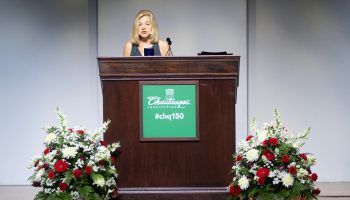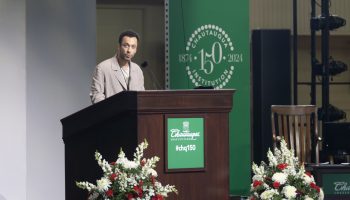NICK DANLAG – STAFF WRITER
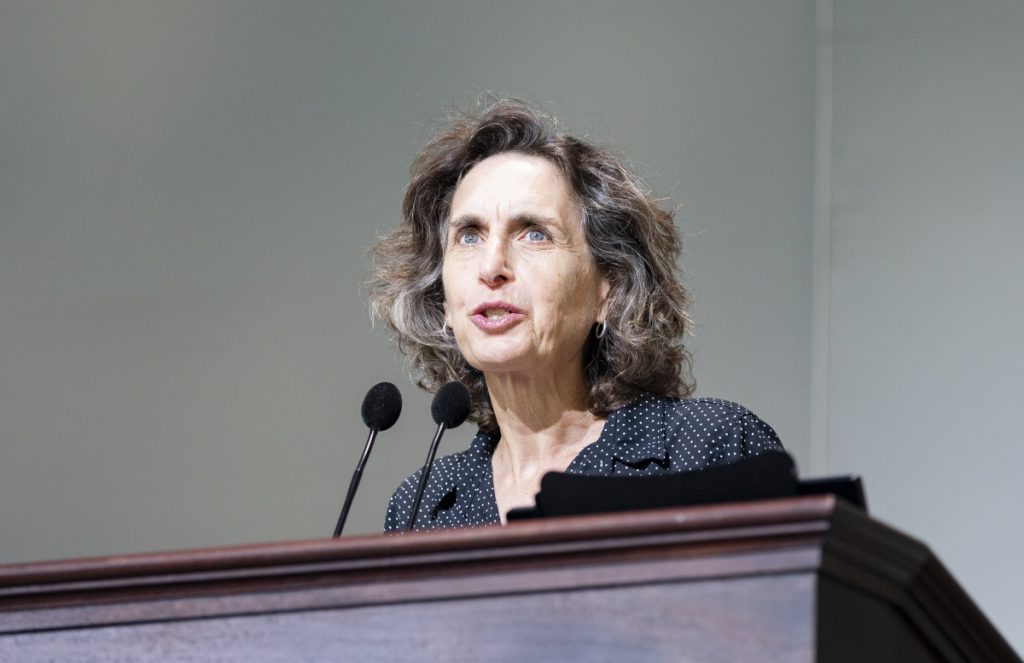
In the early 1900s, the Chicago River was so overrun with sewage that people said a chicken could walk across without getting its feet wet. The river connected to Lake Michigan, where the city got most of its drinking water. So the city’s leaders decided to reverse the flow of the river so that the water went back into the Mississippi River.
A massive construction project was undertaken, said Elizabeth Kolbert, an award-winning reporter and author, and 43 million cubic yards of dirt were moved.
“The project did succeed in achieving its primary aim to preserve the city’s drinking water, which of course is tremendously important. Chicago probably would not be the major city that it is today without that,” Kolbert said. “But it created a new problem, which no one was really thinking about at the time.”
Namely, after the construction project, aquatic animals and plants were able to invade other ecosystems.
Especially carp.
Grass carp were brought into the Mississippi to eat invasive aquatic plant species, stopping their spread without the use of herbicides — only the animals escaped their small enclosures, and now, they make up 75% of the biomass of the Mississippi. They are one of the many invasive species wreaking havoc on the ecosystems of the Great Lakes.
People are trying to solve this problem, caused by human engineering, with more of the same engineering. To deter carp from coming up the Mississippi, engineers added electrified sections, with warnings not to dive, swim or even touch the water. Kolbert said the next plan is to build what one researcher called the “Disco Barrier” that would have water jets and blasting sounds.
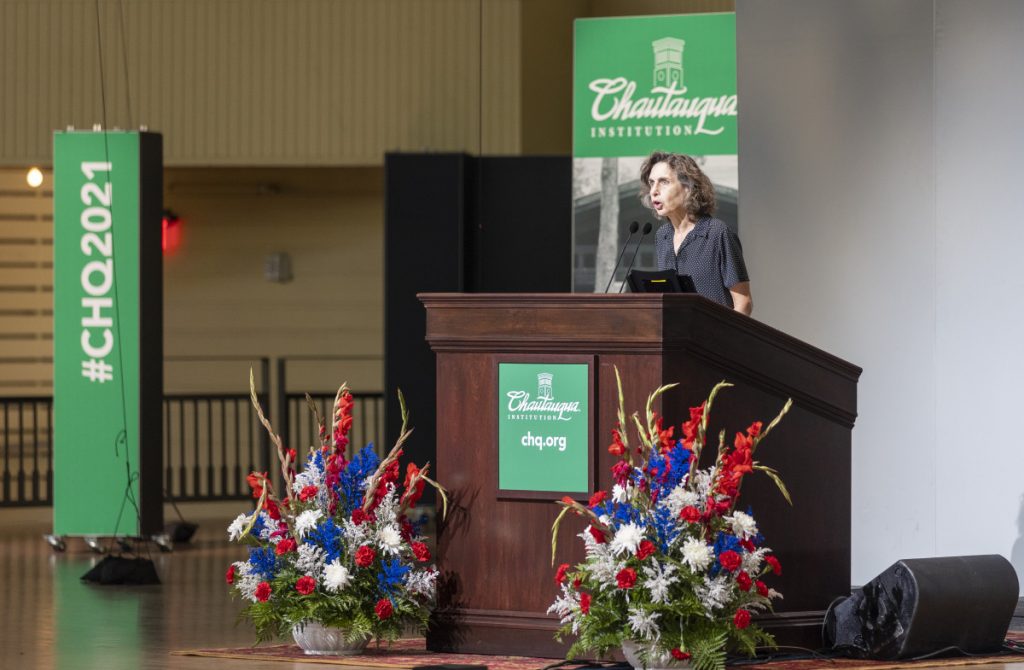
“The response to the problem of control or, if you prefer, control gone awry, is to try to layer on new forms of control. We act as if we believe that if engineering got us into this mess, more engineering will get us out,” Kolbert said. “The projects become more baroque, but we keep at it, either because we don’t see any other options, or because we reject the other options.”
Kolbert is the author of The Sixth Extinction, an influential nonfiction book that won a Pulitzer Prize, and has worked as a staff writer at The New Yorker since 1999. At 10:30 a.m. Tuesday, July 6 in the Amphitheater, she presented her lecture “Under a White Sky,” taken from the name of her new book Under a White Sky: The Nature of the Future, as part of Week Two of the Chautauqua Lecture Series’ theme of “New Frontiers: Exploring Today’s Unknowns.” She discussed humanity’s continued desire to control nature and the lack of will to decrease carbon emissions despite growing concerns and proven evidence.
Throughout the lecture, Kolbert explored a phrase etched on a pillar outside one of University of Wyoming’s buildings built in the 1920s: “Strive on — the control of nature is won. Not given.”
“There was a great deal of faith in the idea that nature could and should be harnessed for human ends,” Kolbert said. “This was at the very heart of what it meant to be an engineer.”
The University of Wyoming quote struck many engineers and scientists and, in particular, authors Rachel Carson and John McPhee.
Carson, in her landmark book Silent Spring, didn’t see humanity’s control of nature as triumphant. Instead, she explored it in a darker key, Kolbert said. Carson wrote about how humanity had visibly changed the environment, through roads and buildings, and also invisibly, through pesticides that indiscriminately killed the creatures it was designed for, but also bugs beneficial for farming, fish, birds and — in some cases — people.
She then read from the final pages of Silent Spring: “The control of nature is a phrase conceived in arrogance, born of the Neanderthal age of biology and philosophy when it was supposed that nature exists for the convenience of man.”
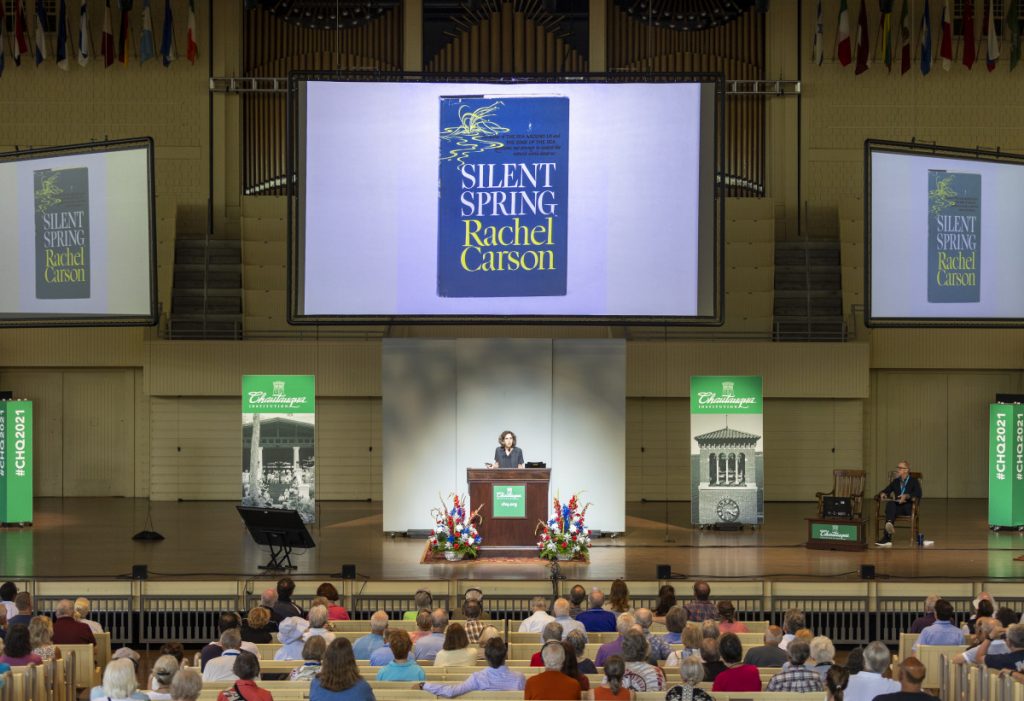
Decades after Carson, McPhee wrote his book The Control of Nature. Whereas Carson struck a dark note of people’s impact on nature, Kolbert said McPhee’s tone was “bemused and skeptical.” In his book, he explored a volcanic eruption in Iceland, where people used around 8 million cubic yards of water to hose down the magma. They claimed that this effort helped save half the island from destruction. McPhee was less sure, to say the least.
“But, as McPhee then notes,” Kolbert said, “the truth of this will never be known, the role of luck being unassessable, the effects of intervention being ultimately incalculable and the assertion that people can stop a volcano being hubris enough to provoke a new eruption.”
Kolbert herself was inspired by the University of Wyoming phrase, and it became a central subject of Under a White Sky.
“Now in 2021, the issue is not so much that we are trying to control nature, either arrogantly per Carson, or ineffectively per McPhee,” Kolbert said. “It is that without even seeking to, we do control nature, and what I mean here by ‘controlling nature’ is that we dominate it, both by design and in many ways, completely inadvertently.”
She described the scale of humanity’s impact. People have directly transformed roughly half of the earth’s ice-free land and indirectly changed the other half. Most of the world’s major rivers are dammed or diverted; the only remaining ones with natural courses are in remote parts of the Arctic, the Amazon and parts of Congo, though Kolbert said that more dams are planned. Humans also cause 100 times more carbon emissions annually than volcanoes, which used to be the world’s main source of emissions.
Ninety-six percent of mammals are either humans or livestock; the total weight of human-made objects is roughly the same as the weight of everything else; the biomass of every animal on earth is 4 gigatons whereas plastics are 8 gigatons; and the world is on track to have more plastic than fish in the oceans in 2050.
Though one solution with much support is to reduce carbon emissions, Kolbert said that there is little evidence that people are changing their ways.
“I, myself, am not an advocate,” Kolbert said. “I’m a journalist, and I see my role not as looking at what we should be doing, but more looking at what we are doing. I just don’t see much in the way of evidence that we are scaling back. Or, to put things more starkly, that we have the will to scale back.”
So what are people doing? As Kolbert said, humanity is “basically betting the future of the planet on more engineering. We are hoping that a new round of engineering can fix the problems created by the old engineering.”
One example is a project in Iceland with large “air conditioners.” These machines take the CO2 out of the air, store it until there is a significant amount and pump it deep underground, where it turns the surrounding rocks into, essentially, chalk, or calcium bicarbonate.
Another more controversial example is solar geoengineering, also called solar radiation management. The concept is that if a large aircraft flew into the stratosphere and released a large number of reflective chemicals, it would lessen the amount of heat Earth would receive from the sun, thus causing global cooling.
“If your reaction to this is, ‘Well, that sounds pretty scary,’ you are not alone,” Kolbert said. “Solar geoengineering has been described as dangerous beyond belief, as a broad highway to hell and it’s unimaginably drastic. The possible side effects are manifold.”
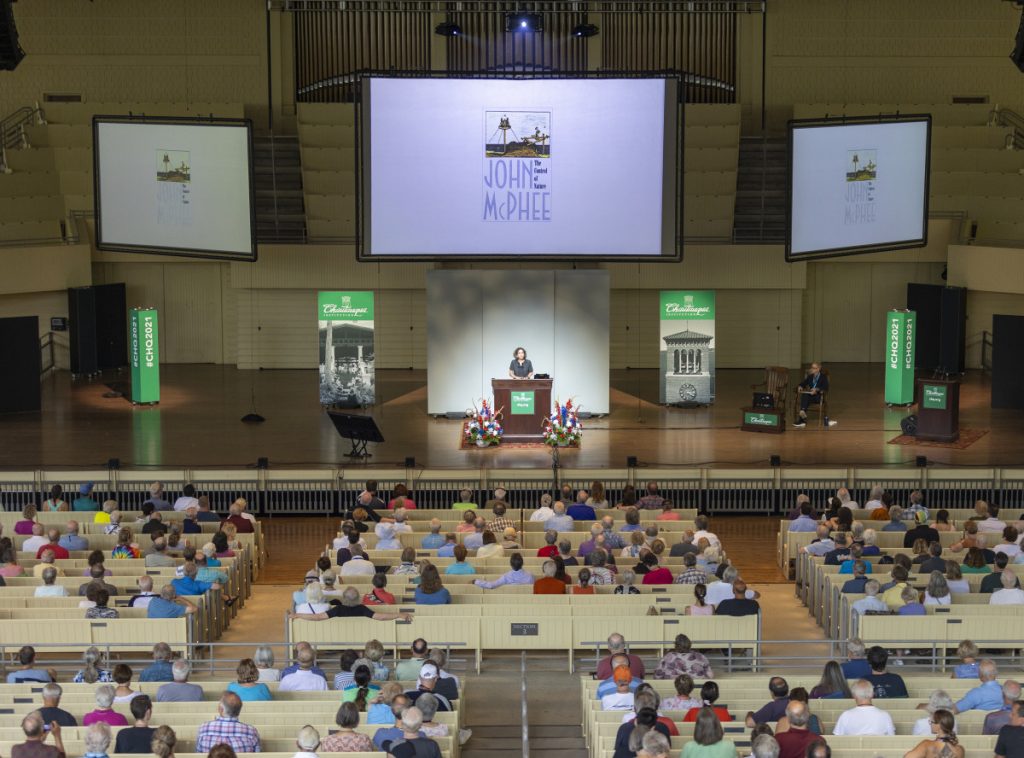
The negative risks would be disrupting ecosystems even further by suddenly changing their temperatures, damaging the ozone layer and even changing the sky to a whiter color. This prospect of a whiter sky is where Kolbert got her book’s title Under a White Sky.
“I also think it’s important to consider geoengineering, and other world-altering technologies against the alternatives. In the case of geoengineering, the alternative is not going back to the climate that we had before we embarked on the world-altering project that is extracting fossil fuels and burning them,” Kolbert said. “That climate is gone. And it is not coming back in any foreseeable future.”
As part of the Q-and-A session, Mark Wenzler, director of the Chautauqua Climate Change Initiative, asked what can people expect from literary arts in helping explore these issues.
Kolbert said that the proof was in the pudding; while many, including her, have tried, there hasn’t been a transformational text covering climate change — yet.
“To be honest,” Kolbert said, “the book of the future may be a miniseries. It may be a tweet. I don’t know what it is going to be. Maybe an Instagram feed. So I don’t know if a book can galvanize public opinion the way that Silent Spring did.”
After the release of Silent Spring, Congress called Carson to testify on the use of pesticides.
“It’s since terribly dated and terribly sexist,” Kolbert said. “But JFK says to her, ‘You’re the little lady who started this all,’ which is a reference to Harriet Beecher Stowe and Uncle Tom’s Cabin, which had an enormous galvanizing effect for the abolitionist movement.”
Wenzler asked what the older generation can say and do for the younger generation so that they have hope and can take action.
“The simplest answer I could give is: There’s no choice but to face these issues. We’re not being given a choice,” Kolbert said.
Kolbert talked about her children, one of whom is going to graduate school for climate science.
“He knows the science better than I do. It’s not a pretty picture. I don’t have to tell anyone here that,” Kolbert said. “If you want to do meaningful work, there’s going to be a lot of meaningful work to be done in the climate sphere. So let’s go out and do it.”



